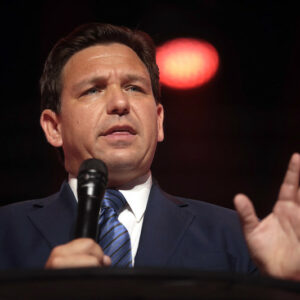Florida governor Ron DeSantis, a shadow presidential candidate, recently minimized the salience of continued U.S. support to Ukraine, portraying the Russian invasion of that country as a “territorial dispute” and claiming that it was not among “vital national interests” for the United States. He was roundly pilloried by other Republican candidates, hawkish Republican establishment politicians and, of course, Democrats as a rube, know-nothing governor with no foreign policy experience.
Yet DeSantis’ position has some merit.
Although DeSantis is technically correct that the conflict between Ukraine and Russia has devolved into a “territorial dispute,” that was not Vladimir Putin’s original intention. He intended for his military to waltz into Kyiv, take the country quickly and make Ukraine a puppet state, somewhat like he has with Belarus to its north. However, the Ukrainians chose to stymie that goal, fighting tenaciously and skillfully to repel grossly incompetent Russian forces. As a result, Putin has had to settle into what likely will be a protracted conflict in Ukraine’s east and southeast to salvage what territory the Russian invasion initially grabbed as Ukraine tries to claw it back.
However, DeSantis’ minimization of the brutal Russian invasion and current large-scale conflagration as a mere “territorial dispute,” although technically correct, is a gross underplaying of what is happening to the hundreds of thousands on both sides who have already died or been wounded. In short, the war in Ukraine is the largest conflict in Europe since World War II and thus could have important ramifications — although not necessarily for the United States.
Although the focus of the outrage was in reaction to DeSantis’ minimization of the conflict as a mere “territorial dispute,” his comment about the conflict not being among U.S. “vital national interests” was a more important point — because it is correct.
This is not 1945, in which Europe and East Asia smoldered in ruin after World War II, thus leaving the largely untouched United States representing half of the world’s gross domestic product. Now the overstretched United States accounts for less than 16 percent of the world’s GDP, yet 38 percent of global military spending; it has accumulated almost $32 trillion in national debt — a not insignificant part of which has been incurred in policing the world, including the long and largely unneeded wars in Afghanistan, Iraq, Libya, Somalia and others as part of the excessive global “war on terror.”
With China continuing to rise, the United States should not again get distracted — as it has been for almost two decades in the greater Middle East — on Ukraine.
Russia, as demonstrated by its massive bungling in Ukraine, is far less of a long-term conventional threat to the faraway United States than it is to the much closer countries of Europe. The wealthy Europeans, who combined have a larger GDP than the United States, should take over the military support for Ukraine — either by providing arms or funding their purchase — against a relatively poor Russia, which has a GDP less than that of Germany alone.
Because the United States can no longer afford to police the world, it should regard Europe as an “economy of force” theater, let the rich Europeans do more for their own security, and redirect even more attention and resources to Asia. The United States has been trying to “pivot to Asia” since the Obama administration, but it always gets distracted by the latest flare-ups elsewhere.
Although the Europeans will argue that they provide more economic aid to Ukraine than the United States, the United States is outstripping all the Europeans combined in military aid to that country. That is fine for the Europeans because temporary economic aid to Ukraine is cheaper than permanently building up their security capabilities to contain even a severely weakened Russia. Why increase spending on security when the United States is providing it?
Contrary to hysteria in the pundit class, DeSantis is correct that even if all of Ukraine fell to Russia, it would not affect vital U.S. security interests — during the Cold War, the United States lived with a Soviet Union that contained Ukraine — although it might make Europe very nervous. Even then, the Russian military had already been so depleted and exhausted by the Ukrainians that it should give the Europeans time to build up their militaries. Because Ukraine is not a vital U.S. security interest, the United States should at least demand that the Europeans take over the supply of military and economic aid to the Ukrainians.
Please follow DVJournal on social media: Twitter@DVJournal or Facebook.com/DelawareValleyJournal

